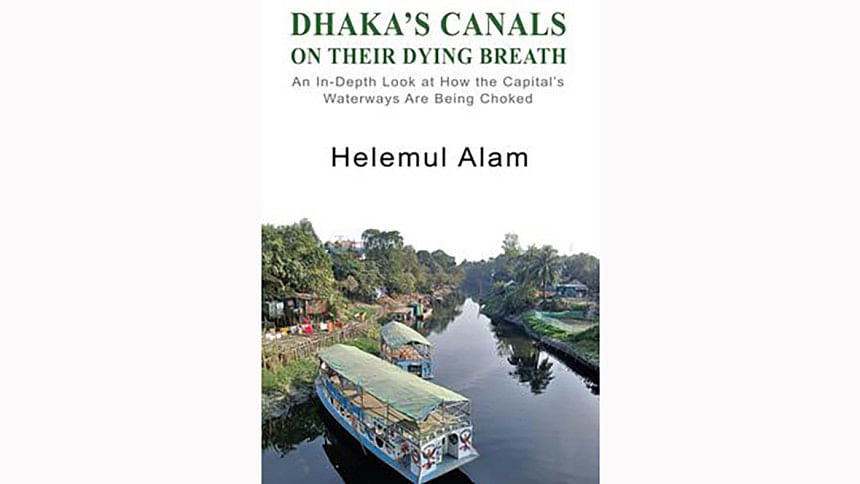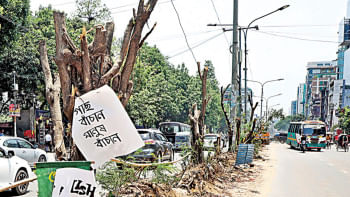Reversing the decline of Dhaka's canals

Water is vital to any city's development, shaping its identity, culture, and future. Dhaka, once intricately linked by its canals, rivers, and wetlands, has lost the natural connection. Rapid and unplanned urban growth, illegal occupation, and neglect have led to the disappearance of many water bodies, making the city prone to flooding, waterlogging, and environmental issues.
The book, Dhaka's Canals on Their Dying Breath, by journalist Helemul Alam, is more than just a historical account; it's a passionate appeal for change. With a thorough investigation and a deep appreciation for nature, Alam uncovers the stories behind the disappearance of Dhaka's canals, highlighting the severe consequences of their loss.
His detailed reporting, combined with personal insights, offers a vivid portrayal of the past, present, and potential future of these water systems. The book emphasises the urgency of protecting and restoring canals through environmentally conscious urban planning, making it an essential read for planners, policymakers, environmentalists, and concerned citizens alike.
In his previous work, Oasis Lost to Urban Sprawl (2023), Alam explored the neglect of Dhaka's ponds. This latest book sheds light on what have led to the decay of the city's water infrastructure and the environmental challenges Dhaka now faces as a result. It outlines how the destruction of natural drainage has turned rain, once a blessing, into a cause of urban distress. Crucially, it looks ahead, proposing realistic and sustainable solutions. And offers strategies for restoring lost water channels, repairing drainage systems, and guiding urban development to be more in tune with nature. Drawing on case studies and expert opinions, the book provides actionable ideas for building a more resilient and sustainable Dhaka.
The author has realistically depicted Dhaka's waterlogging, its causes and consequences. According to him, "In Dhaka, rain brings chaos. Streets become submerged, water invades homes in low-lying areas, and life in the capital slows to a frustrating crawl." He argues that the reasons behind this mess are: canal encroachment, ignored and poor urban solutions. Therefore, once the lifeline of Dhaka, the city's canals are now mere shadows of their former selves—clogged with pollution, suffocated by encroachment, and neglected due to flawed urban planning.
Alam also pointed out that the water retention ponds, originally designed to rescue Dhaka from floods, are now in need of rescue themselves. These basins, meant for stormwater management, are shrinking rapidly due to encroachments, unplanned urbanisation, and government neglect.
The book reveals that the efforts of the Dhaka Water Supply and Sewerage Authority (Wasa) to reinforce canals with concrete U-channels have made things worse. These structures have narrowed the canals, therefore reducing their capacity to carry water. Additionally, the original canal boundaries were not maintained, encouraging further encroachment. Additionally, the construction of embankments has cut natural connections between canals and rivers, including the Buriganga and Turag. This separation has disrupted the natural water flow and damaged the city's drainage system. The author warns that without immediate and sustained intervention, the waterlogging crisis will worsen, as climate change means the city may experience unusually high rainfall at any time.
To reverse this crisis, any flood flow and sub-flood flow zones must be protected. Box culverts should be turned back into open canals where possible. And reviving Dhaka's canals will require restoring their connectivity with rivers, the book argues. Once linked to the Buriganga, Turag, Balu, and Shitalakhya rivers, the canals seamlessly transported excess water.
Protecting retention ponds, recovering canals, and maintaining drainage networks—both surface and stormwater—are crucial to reducing waterlogging. By and large, Alam urges us to take a holistic approach to recover our water channels and waterbodies.
As the city continues to grow, this book stands as both a warning and a guide. It calls on citizens, planners, and decision-makers to reconsider how waterbodies fit into urban life. By adopting greener strategies, Dhaka can reclaim its waterways and build a healthier future in harmony with nature. In a time when cities around the world are learning to live with water rather than fight it, Helemul Alam's work reminds us of what's possible. It encourages us to reflect on our relationship with water and inspires hope that, through collective will and smart planning, Dhaka can move toward a more water-sensitive future.
Dr Adil Mohammed Khan is professor of Department of Urban and Regional Planning at Jahangirnagar University, president of Bangladesh Institute of Planners and director of Institute for Planning and Development. He can be reached at [email protected].
Views expressed in this article are the author's own.
Follow The Daily Star Opinion on Facebook for the latest opinions, commentaries and analyses by experts and professionals. To contribute your article or letter to The Daily Star Opinion, see our guidelines for submission.

 For all latest news, follow The Daily Star's Google News channel.
For all latest news, follow The Daily Star's Google News channel. 









Comments